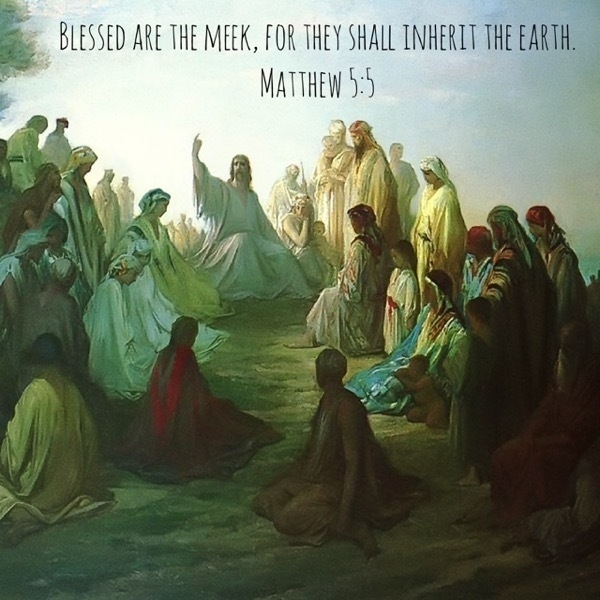A distillation of Dr. Martyn Lloyd-Jones 'Studies on the Sermon on the Mount'. All credit to him. One of the finest preachers and theologian minds of the modern age.

If every person knew what it was to hunger and thirst after righteousness there would be no war. Here is the only way to real peace.
One of the greatest tragedies in the life of the Church today is the way in which so many are content with these vague, general, useless statements about war and peace instead of preaching the gospel in all it's simplicity and purity.
'Blessed Are They Which Do Hunger And Thirst After Righteousness'. If this verse is to you one of the most blessed statement of the whole of Scripture you can be certain you are a Christian. If it is not, then you had better examine the foundations again.
We have been told that we must be poor in spirit, that we must mourn, that we must be meek.
Here we begin to look for a solution. For the deliverance from self for which which we long.
It is the great charter for every seeking soul.
It is doctrinal. It emphasises one of the most fundamental doctrines of the gospel, namely, that our salvation is entirely of grace, or by grace. That it is entirely the gift of God.
Remember 'blessed' means happy. The whole world is seeking happiness, but it is the great tragedy of the world that it never seems to be able to find it.
According to the Scriptures, happiness is never something that should be sought directly.
It is always something that results from seeking something else.
Whenever you put happiness before righteousness you will be doomed to misery. Put happiness in the place of righteousness and you will never get it.
Think of a man who is suffering from some painful disease. If the doctor only treats the pain, and does not discover the cause of the pain, and treat that, he is a very bad doctor. He is doing something that is extremely dangerous to the life of the patient.
We are not meant to hunger and thirst after experiences. We are not meant to hunger and thirst after blessedness. If we wabtr to be truly happy and blessed, we must hunger and thirst after righteousness.
Experiences are a gift from God, but we must covet and seek righteousness.
What is this righteousness then? It is not a sort of general righteousness or morality between nations.
Men wax eloquent about how countries threaten the peace of the world, break their contracts, yetr are disloyal to their wives and disloyal to their own marriage contracts.
There are those who say that righteousness means justification. It does.
But it also means santification.
It means ultimately the desire to be free from sin in all it's forms and in it's every manifestation. A desire to be free from sin because sin separates us from God.
Our first parents were made righteous in the presence of God. They dwelt and walked with Him. That is the relationship a righteous man desires.
And it means the desire to be free from the power of sin. To get away from the power that drags him down in spite of himself.
It means a desire to be free from the very desire for sin. We find that the man who turly examines himself in the lift of the Scriptures is not only in the bondage of sin, more horrible yet is he LIKES IT, he WANTS IT! Even after he has seen it is wrong he still wants it.
To put it positively, to hunger and thirst after righteousness is nothing but the longing to be positively holy. He who does, is a man who wants to show the fruit of the Spirit in every action and in the whole of his life and activity.
But what does it mean to 'hunger and thirst'. It does not mean that we can attain this righteousness by our own efforts. That is the worldy view of righteousness which focusses on man and leads to the individual pride of the Pharisee.
It leads to those things that the apostle Paul describes in Philippians 3 as 'dung'. The first Beatitude tells us that we must be 'poor in spirit' so it cannot be that worldly view of righteousness.
It is a consciousness of our deparate need.
It is something that keeps on until it is satisfied. It is not just a passing feeling, a passing desire. It hurts, it is painful, it is like actual, physical hunger and thirst.
It is like a longing for a person. There is always a great hunger and thirst in love.
The Psalmist has summed it up perfectly in a classical phrase: 'As the hart panteth afcter the water brooks, so panteth my soul after thee, O God, My soul thirsteth of God, for the living God.
As J. N. Darby said, 'when the prodigal son was hungry he went to feed upon husks, but when he was starving, he turned to his father.'
Finally, let's look at what is promised to the people who are hungry and thirsting for righteousness.
'They shall be filled'.
The whole Gospel is there. That is where the gospel of grace comes in. It is entirely the gift of God. You will never fill yourself with righteousness, you will never find blessedness apart from Him.
When you and I know our need, this hunger and starvation, this death that is within us, then God will fill us. This is an absolute promise. If you are really hungering and thirsting after righteousness you will be filled.
How does it happen?
It happens - and this is the glory of the gospel - it happens immediately, thank God. We are justified by Christ and His righteousness and the barrier of sin and guilt between us and God is removed.
You are no longer under the law, you are under grace.
God looks at you in the righteousness of Christ and He no longer sees the sin.
The Christian therefore should always be a man who knows that his sins are forgiven.
He should not be seeking it. He should know he has it. That he is justified in Christ freely by the grace of God.
Thank God it happens immediately.
But it is also a continuing process. The Holy Spirit, begins within us His great work of delivering us from the power of sin and from the pollution of sin. Christ will come into you.
And as He lives in you you will be delivered increasingly from the power of sin and from its pollution. You will be enabled to resist Satan, he will flee from you. You will be able to stand against him and his fiery darts.
Finally, this promise is fulfilled perfectly and absolutely in eternity. There is a day coming when all who are in Christ and belong to Him shall stand in the presence of God, faultless, blameless, without spot and without wrinkle. A new and perfect man in a perfect body.
But there is a paradox. At this moment I am perfect in Christ, and yet I am being made perfect.
The Christian is one who both hungers and thirsts AND IS AT THE SAME TIME filled! You reach a certain stage in sanctification but you do not rest on it. You go on changing!
From glory to glory to glory 'till in heaven we take our place'. Perfect yet not perfect. Hungering, thirsting, yet filled and satisfied, but longing for more, never having enough because it is so glorious and wondrous.
Fully satisfied by Him yet a supreme desire to know Him.


